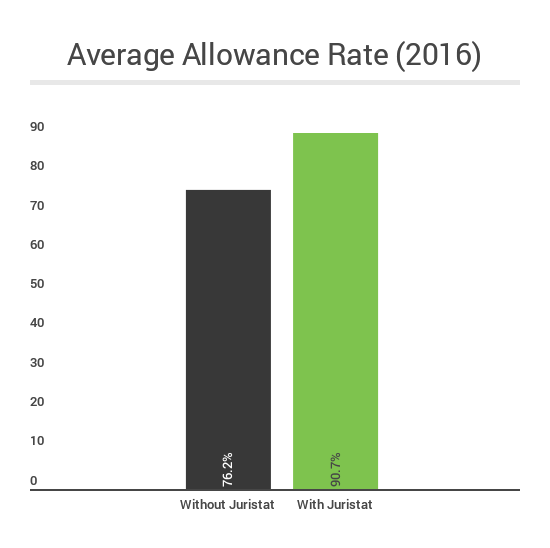In June of 2015, Juristat published its first white paper studying the effect patent analytics had on our customers’ allowance rates, among other metrics. To do this, we separated all of our customers’ applications into two groups. The first consisted of applications where the prosecuting attorney had purchased and used a Juristat Examiner Report or other analytic ("Juristat applications"). The second group consisted of applications prosecuted at the same time by the same firms, but where the prosecuting attorney did not use a Juristat analytic ("non-Juristat applications").
In our original study, we found that our customers' Juristat applications had an average allowance rate that was 10.7 percentage points higher than their non-Juristat applications. Expressed as a percentage, this means that the Juristat applications had an average allowance rate that was 15.7% higher than the non-Juristat applications. See Figure 1 for a visual breakdown of these results.
 Figure 1
Figure 1

A year later, in June of 2016, we wanted to see how our customers from the previous year were doing and whether they were still seeing improved allowance rates using Juristat. We used the same methodology as the first time, and we found that the allowance rate of Juristat applications was now 14.5 percentage points higher than non-Juristat applications. Expressed as a percentage, this means the average allowance rate among Juristat applications is now 19% higher than non-Juristat applications, See Figure 2 for a visual breakdown of these results.
 Figure 2
Figure 2

The data also revealed that, in addition to an increase in allowance rate between non-Juristat applications and Juristat applications, our customers' allowance rate on Juristat applications actually increased by 12 percentage points, or 15.2%, between 2015 and 2016.

Thus, we found that, not only did using Juristat increase allowance rates over non-Juristat applications, but our customers’ allowance rates continued to rise while using Juristat. This is not to say that a law firm’s allowance rate will keep rising forever (it can’t), or that every firm is guaranteed to see similarly high increases. However, allowance rate is a fairly accurate general indicator of a law firm’s strength in patent prosecution, and we look forward to publishing future studies on the effectiveness of using big data on other metrics of prosecution strength.
Curious how much Juristat could increase your allowance rate?
(gradient).webp)